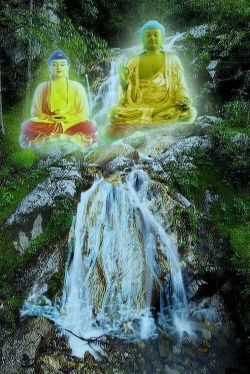Festivals and special practice days of the lunar month
Upcoming special days - see Calendar of events.
The Tibetan calendar is based on precise calculations, different from European astrological tradition. Moon phases are the reference point here, whereas in Western tradition it is the Sun. Phases of the Sun and the Moon are of a different length, that’s why the calendar must be adjusted every year to the solar cycles of days and nights. It happens sometimes that a certain day must be omitted (e.g. after the third lunar day, the fifth one follows), or doubled (e.g. there are two forth days, one after another). It is also possible that the whole month may be doubled.
One of the results of this scheme is that the dates of Buddhist festivals and anniversaries are variable. Only some anniversaries, connected to the current great lamas, are celebrated in accordance with the western calendar.
As a part of Tibetan astrology, there are various calculation systems. We have decided to use the general Tibetan tradition; taking calculations from Dharamsala as a pattern since all the festivals and anniversaries in the Benchen Monastery, a branch of which we are, are celebrated according to this tradition.
THE SPECIAL DAYS ARE:
The Four Great Festivals during the year relate to the life of Buddha Shakyamuni. On these days the effects of positive or negative actions are multiplied 10 milion times:
Chotrul Duchen – last day of the first fifteen days of a new year, during which Shakyamuni Buddha performed many miracles in order to awake devotion in future disciples.
Saga Dawa Duchen – a day of enlightenment and paranirvana of Shakyamuni Buddha. At the age of 35 the Buddha achieved enlightenment in Bodh Gaya.
Chokhor Duchen – seven weeks after achieving enlightenment, Shakyamuni Buddha, encouraged by the gods, Indra nad Brahma, turned the Dhama Wheel for the first time. He taught "Four Noble Truths" to his first disciples.
Lha Bab Duchen – Shakyamuni Buddha came down to the earth from the heaven of Indra. He was there for three months teaching Dharma to his mother, who died soon after giving birth. The Buddha repaid in that way, all the goodness he received from her.
Medicine Buddha & Tara Day - Meditation practice is especially recommended. The effects of positive or negative actions are multiplied 100 times.
Guru Rinpoche Day - Tsok offerings and celebration. Practice of awareness is especially recommended. The effects of positive or negative actions are multiplied 100 times.
Full Moon - Protection of life is especially recommended. The effects of positive or negative actions are multiplied 100 times.
Dakini Day - Tsok offering and celebration. To be observed in the same way as the Guru Rinpoche Day. The effects of positive or negative actions are multiplied 100 times.
Dharma Protectors' Day - Purification and fasting. Confession of the transgression of vows and other similar practices. Tsok offerings and celebration. The effects of positive or negative actions are multiplied 100 times.
New Moon - Protection of life is especially recommended. The effects of positive or negative actions are multiplied 100 times.
We also celebrate:
Vesak – celebration of birth, enlightenment and paranirvana of Shakyamuni Buddha in theravada tradition. Usually, it falls on the full moon of the forth lunar month, though it can be celebrated on different days is different Buddhist traditions. Traditionally in Poland, various Buddhist groups celebrate it together on Sunday closest to an actual date.
Source
[[1]]
